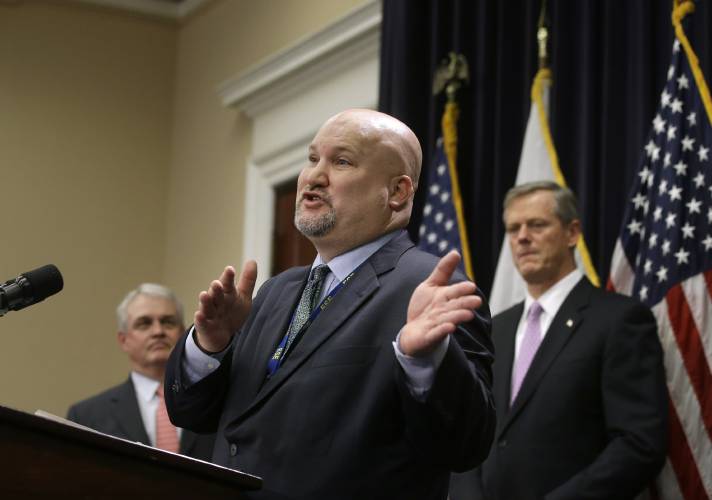Riley to resign as DESE head in March

Massachusetts Commissioner of Elementary and Secondary Education Jeffrey Riley, center, faces reporters as then-Gov. Charlie Baker, right, looks on during a news conference in January 2019 at the State House in Boston. Riley has announced his resignation from DESE, effective March 15. AP Photo/Steven Senne
| Published: 02-16-2024 4:31 PM |
BOSTON — Elementary and Secondary Education Commissioner Jeffrey Riley plans to step down on March 15 after six years leading Massachusetts’ K-12 school system, according to a letter he sent to the state’s education board on Thursday.
Riley plans to recommend to the Board of Elementary and Secondary Education that Deputy Commissioner Russell Johnston serve as acting commissioner. Riley will stay on as an advisor through the end of the school year, according to a press release from DESE.
The commissioner wrote in his resignation letter, dated Feb. 15, that it was “the right time for me to pass the baton.”
“On a personal level, my role as a son to aging parents requires more of my time, and my commitment to provide that support is not compatible with the demands of the commissioner’s job. More broadly, as I reflected on major new initiatives such as the Literacy Launch, I realized the commonwealth needs and deserves a commissioner who can commit on an all-in basis for at least another five years, and I simply cannot do that,” he said.
Gov. Maura Healey recently proposed a $30 million “Literacy Launch” program to get higher-quality literacy materials into dozens of districts as young students have shown persistent challenges in reading and writing — an initiative that was largely met with support from Riley and the state education board.
In his resignation letter to the board, the commissioner listed accomplishments during his tenure as including the “adoption of a new comprehensive health and physical education curriculum framework” last year that changed the way sex education is taught in schools, “the continued diversification of our educator corps,” “significant expansion in our early college programs and after-dark career technical education programs,” and “creation of an innovative science assessment and a new civics assessment,” among others.
Riley led the state’s education department through the COVID-19 pandemic, when he had to make calls to close and then reopen schools, launch pool testing and provide guidance on mask mandates.
In his letter to the board, Riley called the pandemic “the central, novel challenge of our time together.”
Article continues after...
Yesterday's Most Read Articles
 Authorities ID victim in Greenfield slaying
Authorities ID victim in Greenfield slaying
 State records show Northfield EMS chief’s paramedic license suspended over failure to transport infant
State records show Northfield EMS chief’s paramedic license suspended over failure to transport infant
 Police report details grisly crime scene in Greenfield
Police report details grisly crime scene in Greenfield
 On The Ridge with Joe Judd: What time should you turkey hunt?
On The Ridge with Joe Judd: What time should you turkey hunt?
 ‘I have found great happiness’: The Rev. Timothy Campoli marks 50 years as Catholic priest
‘I have found great happiness’: The Rev. Timothy Campoli marks 50 years as Catholic priest
 Formed 25,000 years ago, Millers River a historic ‘jewel’
Formed 25,000 years ago, Millers River a historic ‘jewel’
“Especially important were our contributions to the national research on the safety of 3 feet of social distancing, our implementation of a new ‘Test and Stay’ protocol, and the decision to require that all schools return to in-person learning beginning in April 2021, over strong objections from many, when it became apparent that in-school transmission rates were extremely low. Indeed, we provided early warnings that prolonged disruptions to in-person learning would also create significant challenges to students’ mental and physical health and wellbeing,” he wrote.
Riley received pushback from all sides for his decisions related to the reopening of schools — from those who believed schools should have reopened sooner and those who worried about continued transmission of the virus between children. In the years since schools reopened, among the commissioner and department’s main focuses has been helping children recover from the academic and social setbacks that being out of school caused.
He has been a voice of support for the Massachusetts Comprehensive Assessment System, or MCAS, at a time when the test has come under scrutiny; pushed to get kids back in the classroom as chronic absenteeism has been on the rise; and recently celebrated the passage of new sex education standards that are more up to date and inclusive of LGBTQ people.
“From an early age, my parents instilled in me the belief that anyone can do anything in this country if they just worked hard enough. I came to realize, however, that only works if all kids start in the same place,” Riley said in a statement. “In my 30-plus years in education, I have strived to level the playing field to give all children equal opportunities to achieve. It has been the honor of my lifetime to work on behalf of the students, teachers and families of the commonwealth. I am very grateful for the opportunity and proud of what our team at DESE has accomplished.”
Riley started his teaching career in Baltimore before going on to work in the Boston Public Schools, serving as principal at the Edwards Middle School. He went on to be appointed as the academic superintendent in charge of middle and K-8 schools in the Boston Public School District. Just before his time as DESE commissioner, Riley worked as the first state-appointed receiver of Lawrence Public Schools.
DESE Board Chair Katherine Craven released a statement thanking Riley for his work “during an historic time of pandemic, societal and educational disruption,” and for “prioritizing the urgent need to return children to in-school learning.”
“From his advocacy for universal school meals, his groundbreaking work in creating, championing and expanding the Early College program across Massachusetts, his nationally recognized work on Deeper Learning, to his support for access to high-quality, evidence-based reading instruction for all students,” Craven said, “Massachusetts students will enjoy the benefits of his work for years to come.”

 Pro-Palestinian protesters set up encampment at UMass flagship, joining growing national movement
Pro-Palestinian protesters set up encampment at UMass flagship, joining growing national movement Franklin Tech student welds artistic bench for French King Bridge
Franklin Tech student welds artistic bench for French King Bridge Wendell voters to decide on battery storage bylaw
Wendell voters to decide on battery storage bylaw
